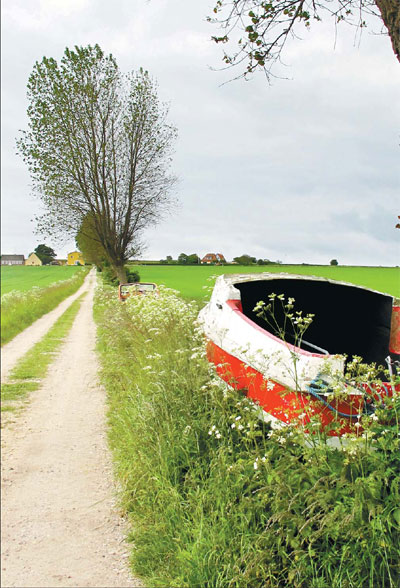Days of wind and roses
Updated: 2012-06-17 07:48
By Mike Peters (China Daily)
|
||||||||
|
Aero island's age-old ties to the sea are always in sight. Photos by Mike Peters / China Daily |
Centuries of seafaring and a passion for sustainable energy make Denmark's Aero an idyllic retreat. Mike Peters pedals his way across a charming island.
Cycling through the old-world Danish town of Marstal requires careful attention - and not just because the cobblestone streets make for a rather rattling ride. I'm pedaling along with Erik Kromann, who not only speaks softly but gives directions in the lingo of the Ancient Mariner. "Turn starboard," the director of Marstal's Seafaring Museum murmurs after we've wheeled a few blocks from his office. He's about half a bike length ahead of me, so I can't read his face. Is he joking? Testing me? Neither, I decide.
I've spent the past two hours with him touring the intriguing museum and lunching on bread, cheese, locally brewed beer and Riga Black Balsam, a herbal cousin of Jaegermeister that local sailors cut with a big splash of schnapps.
Kromann is simply navigating the way he and his family always have, and - discretion being the better part of valor - I drift behind him a little until the rightward twitch of his front tire reminds me which way starboard is.
Marstal is the biggest town on Aero, an island south of Copenhagen that's become as famous for looking to the future as for savoring its nautical past.
That contrast is best illustrated by its most talked-about contemporary visitors: Rick Steves and Queen Margrethe II.
TV travel host Steves has showcased Aero in a "Best of Denmark" episode that features the boyish television personality pedaling cheerfully along coastal bike paths, encountering swans and other creatures, and savoring the pastoral lifestyle that has long lured retirees and others ready to escape the drumbeat of big-city Copenhagen.
Steves has also made much of the island's commitment to green energy, and visitors encounter wind turbines and fields of solar panels that dot the landscape, which produce 130 percent of the heat needed for this community of about 6,500.
The queen, meanwhile, is an occasional visitor because the island remains an important yachting center - and, baby, has the queen got a yacht! (Locals love her common touch, too. On Areo, showing up on a big boat is merely a signal that "she's one of us".)
While the chicness of renewable energy is new, the processes are not.
"We have a long tradition of harnessing the wind here," says Rune Schmidt of Aero Energi. The wind, after all, powered sailing ships and thus the local economy for centuries.
Four Dutch-style windmills, built in the 1200s, still loom on the island's horizons. Schmidt himself is one of five people who run Marstal's solar-energy plant, which until recently was the biggest in Europe.
The plant is part of a 30-year movement away from fossil fuels by Denmark, and Marstal continues to test new solar-collecting technologies, explore the possibilities of biomass (wood-chip burning) and export its renewable-energy savvy around the world.
That process is a two-way street. Schmidt's team is testing a parabolic collector from the US ("not ideal for Nordic climates - better near the equator where there is year-round sun") and vacuum-tube collectors now widely manufactured in China ("high energy production and the once-prohibitive cost is becoming more competitive").
Ten years ago, Aero jumped into a contest seeking to be named Denmark's most environment friendly island. It didn't win, but that seems to have made locals even more determined to make their home a showcase.
Many are investors in their windmills, and they enjoy energy sources that offer 20 years of price stability. The sun and wind are free, no matter how OPEC or Middle East wars affect the price of oil.
Ten years ago residents weren't sure they wanted wind turbines on the horizon; today they take pride in what have become icons of smart energy consumption.
While this small community's triumphs in energy self-sufficiency are fascinating, most visitors come for a great escape, a step back in time.
Like Rick Steves, I am here to revel in the tang of salt air. I am loving the sounds of songbirds in the garden of Pension 44, the delightful bed-and-breakfast run by the amiable Brit Susanna Greve at the island's other chief town, Aeroskobing.
It's full of charming cafes and carefully preserved houses that turn street views into hollyhock-lined rainbows, while cozy shops offer antiques, crafts and fine woolen clothing.
And cycling a beach path banked with fragrant wild roses makes pedaling around Aero for a couple of days a heady vacation indeed.
Contact the writer at michaelpeters@chinadaily.com.cn.


 'Taken 2' grabs movie box office crown
'Taken 2' grabs movie box office crown
 Rihanna's 'Diamonds' tops UK pop chart
Rihanna's 'Diamonds' tops UK pop chart
 Fans get look at vintage Rolling Stones
Fans get look at vintage Rolling Stones
 Celebrities attend Power of Women event
Celebrities attend Power of Women event
 Ang Lee breaks 'every rule' to make unlikely new Life of Pi film
Ang Lee breaks 'every rule' to make unlikely new Life of Pi film
 Rihanna almost thrown out of nightclub
Rihanna almost thrown out of nightclub
 'Dark Knight' wins weekend box office
'Dark Knight' wins weekend box office
 'Total Recall' stars gather in Beverly Hills
'Total Recall' stars gather in Beverly Hills
Most Viewed
Editor's Picks

|

|

|

|

|

|
Today's Top News
Health new priority for quake zone
Xi meets US top military officer
Japan's boats driven out of Diaoyu
China mulls online shopping legislation
Bird flu death toll rises to 22
Putin appoints new ambassador to China
Japanese ships blocked from Diaoyu Islands
Inspired by Guan, more Chinese pick up golf
US Weekly

|

|








